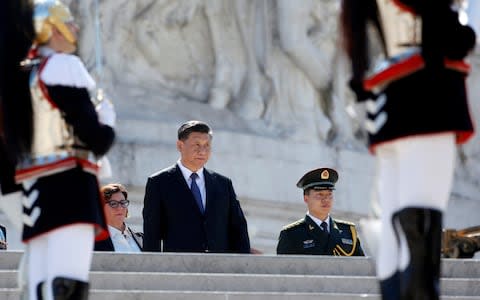China's President Xi feted in Rome as Italy signs up to Beijing's New Silk Road amid EU and US concerns

Grenadiers in bear skin hats and cuirassiers in shining armour and plumed helmets gave China’s president a lavish welcome to Rome on Friday as he prepared to sign a deal that will wrap Italy into Beijing’s ambitious plans to create a 21st century Silk Road.
The signing of the accord will be the highlight of Xi Jinping’s three-day visit to Italy, which China sees as a key node in its massive Belt and Road infrastructure project and a valuable access point to European markets.
Waving red flags, crowds of Chinese sang patriotic songs as President Xi visited the Tomb of the Unknown Soldier at the foot of the Vittoriano, a vast 19th century stone monument in the heart of Rome.

He was feted at the Quirinal Palace, the former papal residence which is now occupied by Italy’s president, and attended a state dinner at which Andrea Bocelli, the Italian tenor, was to perform.
But Italy’s signing up to the Belt and Road Initiative, which will take place on Saturday, has alarmed the country’s friends and allies, including the United States and European Union.
As President Xi received a welcome normally reserved for royalty, EU leaders in Brussels warned that China was as much a competitor as a partner.
European leaders are concerned over the growing role of government-controlled Chinese firms benefiting from state subsidies and fear that the Belt and Road Initiative is a Trojan horse by which Beijing can extend its strategic influence in Europe, Africa and Asia.
"China is a partner, but it is at the same time a competitor," said Sebastian Kurz, Austria’s chancellor. "It's crucial that there be fair trade conditions."
The EU recently described China as “a systemic rival”.

Its hope of presenting a united front towards China has been weakened by Italy breaking ranks and becoming the first G7 economy to endorse the New Silk Road initiative.
Italy has tried to dismiss those fears, presenting the initiative as a win-win situation which will improve infrastructure at ports such as Genoa and Trieste and boost its ailing economy, which recently slipped into its third recession in a decade.
Sergio Mattarella, Italy’s president, said the accord to be signed at a ceremony in Rome would be “the ideal framework for increasing joint collaboration” and would draw Chinese investment to Italy.
A number of trade and infrastructure deals, worth around €7 billion, are to be agreed between the two countries.
President Xi said China’s intention was to “revitalise the ancient Silk Road in order to better share the fruits of humanity's progress.”
